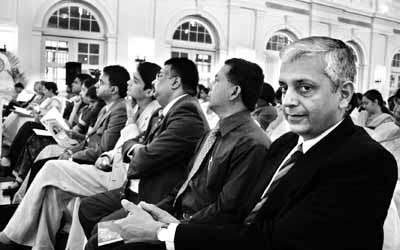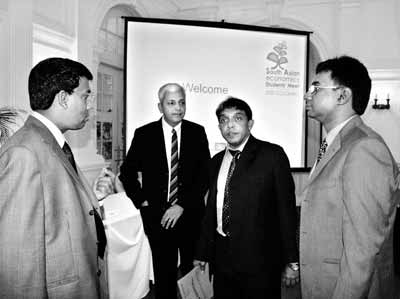
SA students join forces to discuss future of regionUndergraduates from Bangladesh, India, Nepal, Pakistan and Sri Lanka gathered at the Galle Face Hotel last week to participate in the 4th South Asian Economics Students' Meet, an annual gathering for students to discuss and exchange views on the economies of the region.
Lecturers from leading universities in the region discussed pertinent issues such as promoting business environment and regional trade in services in South Asia and economics of the aging population. "This annual get-together of undergraduate students in economics from the South Asian region obviously covers a minute fraction of the corresponding category of students in the region but as an idea and a concept, it is of enormous significance," said W.D. Lakshman, Professor of Economics and former Vice Chancellor of the University of Colombo, addressing the gathering. "This year's event adds yet another significant feature to the event, namely the prominent involvement of the World Bank in its sponsorship," said Prof. Lakshman. "This clearly adds stature to this youth meet. I hope this new feature added this year will continue to strengthen the young economists' meet in the years to come." Other speakers on the panel were Sri Lanka Coordinator of the Meet from the University of Colombo Dr. Sirimal Abeyratne , Vice Chancellor Professor Thilak Hettiarachchy, Head of the Department of Economics Professor Nimal Attanayake and a representative from the World Bank. Prof. Lakshman spoke on 'Young Economists for Innovative Development Strategy Making', saying that innovation is very much needed in matters of development policy formulation. "Social sciences today are in a crisis," he said. "Prevailing world conditions are gradually reducing the space available to social sciences for autonomous and independent thinking. Many pressures operate on us with the social scientists keeping us chained with the frontiers of orthodoxy." He continued by saying that the government or the authorities in every society or nation state, big or small uses their power to discourage research into new knowledge that can be threatening to the power of the social elites. "Their power in society is ensured as long as they can keep people believing that there is no alternative to globalization and completely liberal market." Students from universities in Bangladesh, Nepal, Sri Lanka and India submitted papers on the economics of the aging population in South Asia. Anik Ashraf and Raihan Shafique from North South University in Bangladesh say that just like in Sri Lanka and India, aging of population is recently becoming an issue of concern in Bangladesh. "With successful reduction in fertility and mortality rates the number of aged people has recently increased and seems it will increase further in the very near future." Ashraf and Shafique said that although the current social structure gives a good security to aged people, not enough public support is being provided to these people.
The aging population will also affect the economy of various sectors like the labour fore and expenditure budget. Similarly, H.M.D. Subhashini Herath from the University of Kelaniya in Sri Lanka says countries are making their development policies according to the quantity and quality of their labour force but that concern lies with issues arising from the context of poverty, labour market, urban family life, economic transformation, public responsibility and social security for the aged. Incidentally, South Asia has the highest incidence of global poverty with 43% of the population falling into that category. Priyanwada Herath from the University of Colombo submitted a paper on the business environment in Sri Lanka, focusing on the incompleteness and inconsistency of policy reforms. Herath wrote that Sri Lanka is the first country in South Asia to open its economy in 1977 and is more open today than any other country in the region. "Contrary to popular anticipation followed by policy reforms, the country's investment performance lagged behind." Herath studied the factors underlying the business environment of the country as the key to understanding the sluggish investment performance of the country. Abhijeet Singh from the Hindu College at the University of Delhi researched the challenges ahead for the business environment and public sector education in India. Singh evaluated public policy in India in the field of elementary education and is aiming to understand the current context of education in India to assess why public policy in this regard has not succeeded. "It is found that one of the major factors contributing to this failure is a lack of good business environment or work culture, in the framing as well as the execution of these policies." Vice Chancellor of the University of Colombo, Professor T. Hettiarachchy said it is heartening to see that the conference series, which is intended to promote networking and scholarship between peer Faculties of Economics in the region, provides a forum for university students to share each other's experience and to work towards collaborative work in the future. |
| || Front
Page | News
| Editorial
| Columns
| Sports
| Plus
| Financial
Times | International
| Mirror
| TV
Times | Funday Times || |
| |
Copyright
2007 Wijeya
Newspapers Ltd.Colombo. Sri Lanka. |

